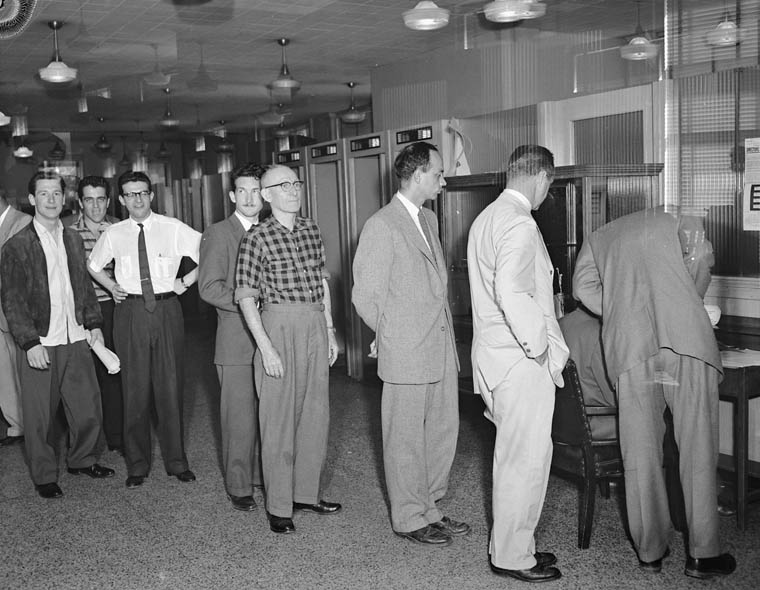 I recently spent a miserable 2 hours and 15 minutes at the Chicago Department of Business Affairs & Licensing, and wanted to share my experience in case anyone in the Mayor Daley’s bureaucracy is listening.
I recently spent a miserable 2 hours and 15 minutes at the Chicago Department of Business Affairs & Licensing, and wanted to share my experience in case anyone in the Mayor Daley’s bureaucracy is listening.
My experience
Our company was recently given a fine for not having and posting a City of Chicago Business License. Well, we didn’t know we were supposed to have one. So, fine, I was going to figure this out.
I go to the city’s website and request to schedule an appointment online. The website says “Your appointment will be confirmed via email within one (1) business day from receipt of the original request.” Two business days come and go, and I hear nothing, so I decide to call them.
Two days later, I go for my appointment. In preparation, I had spent 30-40 minutes gathering information for and completing the 2 page application. I arrive, check in, and am told to wait in the waiting area with about 30 chairs, 15 other people, and CNBC blaring at a ridiculous volume. A giant painting of Mayor Daley watches over us paternally, and signs below him indicate in big letters that
- All cell phone use is prohibited, and
- The office is monitored by the Chicago Police Department, should I decide to do something rash because of, say, extreme frustration at the process I am about to endure.
10 minutes after arriving, the “Business Consultant” with whom I have an appointment (let’s call her Joan) calls me in. I sit in Joan’s cubicle and give her my 2 pages of forms. I then proceed to watch quietly as she very slowly copies the information on my forms into her computer. During the process, she asks me to clarify a few things (e.g. “What are the home addresses of the members? What does this word say?”) This takes 30 minutes. To enter… 2… pages… of… forms…
Joan then tells me to wait in the waiting area for a response, which will be approximately 20 minutes.
40 minutes later, as I’m trying to figure out why its taking so long, Joan finally calls me back in. We sit at her cubicle again, and she explains to me that the city’s zoning division could not approve our city license without asking a single follow-up question: do we do repairs on-site? No, no repairs. “Okay, I will convey that information to them. You will need to wait outside for another 20 minutes for the zoning department to review your answer and approve your license.“
What?
So, I head back out into the waiting area, where members of a CNBC panel are yelling at each other about whether mortgage rates will rise or fall. This time I notice that, while waiting for a response, she had called in two other people to help them out. I’m all for parallel processing, but if what could have taken less than 5 minutes to get a response now requires me to wait 30 minutes because Joan decides to see two other people, I tend to get frustrated.
Joan finally appears. She tells me that the license has been approved, and I can either wait for it to be printed, or have it mailed to our business. I figured, since I’m here, I will wait. What’s a few more minutes?
I pay for our license ($250), taking another 5 minutes, and sit back down to wait.
I should have had it mailed. Another 20 minutes pass before I am called back up and given a license.
Why is this frustrating?
I spent over 2 hours at the Chicago Business Affairs & Licensing Department. ~75% of my time there was spent waiting, the other 25% spent watching Joan type in my information. My company had to pay me to wait, and my tax dollars had to pay for Joan to be an overpaid order entry monkey.
Why could I not have just typed this form into a website directly? Sure, some people will not be able to follow simple instructions online, and will require someone from the city to walk them through it. But my guess is that this comprises no more than 30% of business owners who come into the department.
Come on Chicago, get with it! The cost of this license wasn’t $250. It was $250 + my >2 hours + the “Business Consultant”‘s time + overhead maintaining a giant Business Affairs & licensing Department.
The kicker
Two days after this ordeal, I get a call from the Business Affairs & Licensing department. They are calling to respond to the original website submission, to help me schedule an appointment. Remember that one? The one that was supposed to be “confirmed via email within one (1) business day from receipt of the original request.”? Right. It took four business days to give me a call.



 I love
I love 
